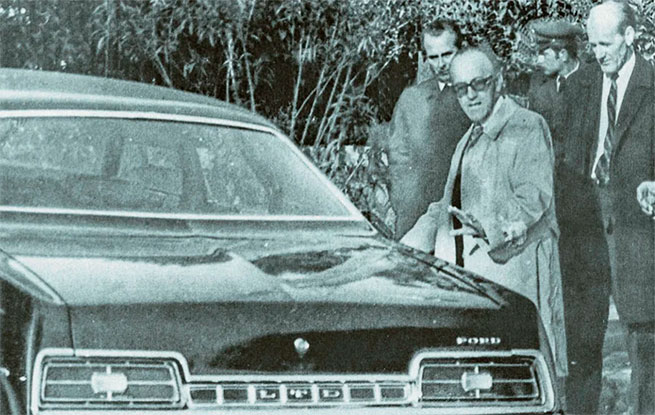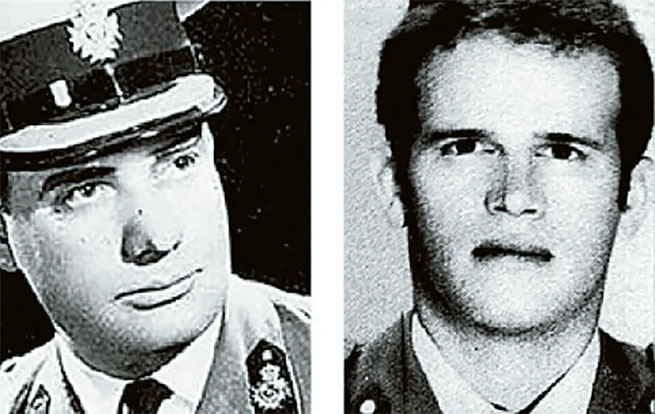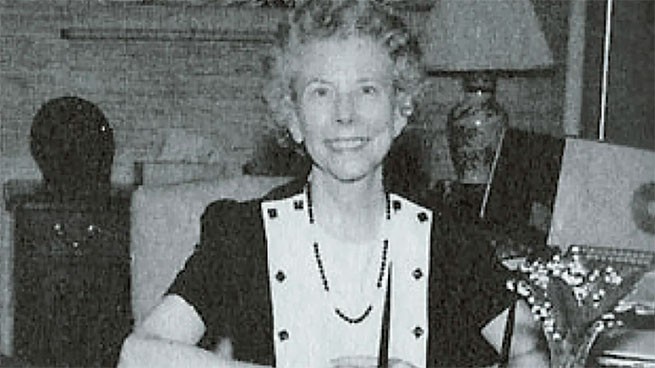It was a typical hot summer day in 1978 when Eloise Page landed at Eastern Airport. At that time, few people paid attention to the short, lean American woman with an arrogant expression on her face.
In her mid-fifties, Paige was the first woman in CIA history to be appointed chief of station, which allowed her to overcome the barrier of male dominance.
When in Langley she was offered a choice between Canberra (Australia) and Athens (Greece), she chose to come to the “hot spot” of the US Central Intelligence Agency at that time. With memories still fresh of the murder of 17N Station Chief Richard Wells on Christmas Eve 1974, the CIA’s Athens station bore the brunt of finding his killers.
Page had been with the CIA since its inception, and her transfer to chief of station at the Athens embassy sparked a storm of opposition from those who considered her unsuitable for the position. But she didn’t care about their opinions, she often entered into direct confrontation with them, fearing nothing, because she knew the internal secrets of the Service and the details of the personal lives of her colleagues, which could end their careers.

Richard Wells, head of the CIA office in Athens, was assassinated on Christmas Eve 1974 17N
Spy since 22 years old
Eloise Page entered the world of agents when she was just 22 years old, and in May 1942 she was hired by General William Donovan in the Office of Strategic Services (OSS). Her boss, considered the founder of the CIA, quickly discovered that his diminutive assistant had a keen interest in intelligence gathering and espionage. So he took her with him to the newly created agency in 1947, and Eloise did not contradict him, quickly taking charge of various projects.
In the early 1950s, she headed the CIA’s Scientific and Technical Operations Division and very quickly managed to prove her worth, despite the fact that higher-ups did not pay attention to what she told them. Her department collected a huge amount of data and information in the form of dozens of reports, from which it appeared that the Soviet Union was planning to launch a satellite into space.
This was a time when America and the Soviet Union were competing to be the first to launch a satellite into space, and in the spring of 1957, Page briefed the agency’s top brass about it in detail. “We had,” she would say many years later, “everything we needed for it, from the launch angle to the date.” The launch into space was supposed to take place from September 20 to October 4.
The satellite was launched on the last day of Page’s space date, which caught Americans by surprise after Jack White, head of a committee at the Office of Scientific Intelligence, rejected dozens of reports coming from Page’s department. When she even came to talk to him, saying that the launch would be a failure for the agency, he told her that her evidence was just Soviet disinformation. He even bet Paige a box of champagne that the launch would not happen, and the next day the young agent entered the office and saw that it was full of champagne.
The American media attributed the Soviet success to the failure of the CIA, which was accused of “sleeping through” the substitution of the Sputnik launch. It was then that some people familiar with Paige’s work gave her the nickname “Iron Butterfly”, which this brilliant woman did not immediately understand.
Athens challenge
That she rose to staff positions in subsequent years was due not only to her skill and tenacity, but also to the fact that she spent a lot of time behind the scenes, so she knew the dark and unspoken secrets of all corners and departments of Langley.
She used them as she saw fit while leading programs such as Operation Lincoln, in which civilians traveling to the Soviet Union were briefed by the CIA before leaving so they could gather as much information as possible without risk. Upon returning to the United States, they reported to CIA analysts what they had seen and observed in the cities they visited during their stay in the Soviet Union.
Along with several other women, Paige served as a senior executive in a male-dominated building, going so far as to oversee and approve funds for secret overseas operations. As one CIA official said years later, “she scared some people so much that they flinched when they saw her in her office,” but she remained an inside senior executive with no operational experience.

Richard Wells
Greek-American Mike Kalogeropoulos, then a young agent, saw first-hand the uproar when Paige was appointed head of the embassy’s section in Athens. It was whispered that she was the first woman to hold such a position in the history of the CIA, and the reaction was negative. Eloise, as usual, didn’t care what they talked about, although she did find out everything about it, since she had other concerns, chief among which was the infamous “Farm”, the secret CIA camp where all the field agents were trained before going on business trips abroad.
“She was 5-foot-5 and skinny,” Kalogeropoulos told The Washington Post after he found himself on the training ground behind a woman old enough to be his mother. “She fired, immediately dropped the gun from her hands and fell into the mud.” Paige stood up and tried again. Kalogeropoulos helped her by “holding her shoulders while shooting to prevent her from falling backwards.” In 1978, he too was transferred to Athens, one of the CIA’s busiest sites at the time, and Page replaced Claire George, who had been appointed to replace the murdered Richard Wells.
Hunting for terrorists
Paige has settled into a new place, and her main task is to find the killers of Richard Wells, so she told the operatives to find new sources that will lead them somewhere. She demanded hard work from everyone, reports on the work done, and began to feel the hostility of several men who would not tolerate being bossed around by a woman. She did not like ouzo and Greek cuisine, as a southern “aristocrat” who had never married and did not feel the need to become a mother.
One of the myths that followed her appointment is that when the mythical – to his colleagues – Ghast Avrakotos, who served in Athens, learned that Page was coming as chief of the station, he asked her to leave immediately.
Some of his former colleagues suggest that if he had stayed, his constant insults and rude nature would have made Page “blush” because he did not understand anything. On the contrary, Kalogeropoulos treated her with sympathy, and sometimes in the evenings they drank sherry at the residence of the head of the station in Psychiko, discussing various issues.
On the evening of January 16, 1980, it was pouring rain in Athens when the newly installed deputy commander of the IAT, Pantelis Petrou, got into his official car on Piraeos Street. The driver, police officer Sotiris Stamoulis, was heading towards 18 Diagora Street in Pagrati, where Petrou had his residence, when two or three people ran out into the street 100 meters from their entrance.
Eleven bullets fly from two .45-caliber pistols, pierce the windshield and hit two police officers, causing the deputy riot police commander who took six of them to die on the spot. The remaining five seriously wound Stamulis, who manages to get out and hand over a service radio to the girl who happened to be in front of him at that moment in order to call for help.
An hour later, Page receives a message about a new “November 17” strike, which that same evening drops its proclamation at the university and raises CIA agents in Athens. She works closely with the Greek authorities, trying to decipher the terrorist organization and its methods, and works endlessly. She knows that many agents in Athens dislike her, but when she is called to CIA headquarters, she has no idea that this is all a setup to get rid of her.

MAT deputy commander Pantelis Petrou (left) and his driver Sotiris Stamoulis. On the evening of January 16, 1980, eleven bullets fired from two 17N .45-caliber pistols, pierced the windshield of a police car and hit two police officers. Peter was killed instantly. Stamulis, who received five bullet wounds, died a few days later.
Betrayal
A group of agents from Athens coordinate with some employees in Langley, and when Page arrives in America, her “colleague” lands in the Greek capital. She goes to the embassy and in a conversation with the agents says that if they want to get rid of her, then he will be the next head of their station, but the plan does not work. Having had antennas everywhere for many years, the “iron butterfly” receives information about the betrayal and, having received assurances from the CIA leadership that she cannot leave, returns to Athens. She calls all the agents to gather and divides them into two groups – those who supported her and those who betrayed her, mainly to show that she cannot be deceived. She knew exactly what each “traitor” had said, and after the meeting, the two high-ranking field agents were immediately transferred out of Athens on her orders. Deeply conservative and anti-communist, she maintained excellent relations with the New Democracy government and was shocked when PASOK won the elections to form a government in October 1981.
She doesn’t even allow news to be passed on to CIA headquarters and reports written up, which was a big mistake for her position. After three years in Athens, she returned to the United States, but was now given uninspiring desk work, sidelined by continued work at the Defense Intelligence Agency. She did not return to Langley until her retirement, which sent her to her beloved South, where she lived the last years of an imaginary but lonely life in which she had everything.







More Stories
Who is he – the only Greek god Pan who got into the chronicles of Plutarch, and what does Jesus Christ have to do with it?
How a cuckolded husband in Ancient Greece paid for his wife’s betrayal and what does the donkey have to do with it?
On this day, Koukidis sacrificed himself to stop the Nazis from desecrating the Greek flag.